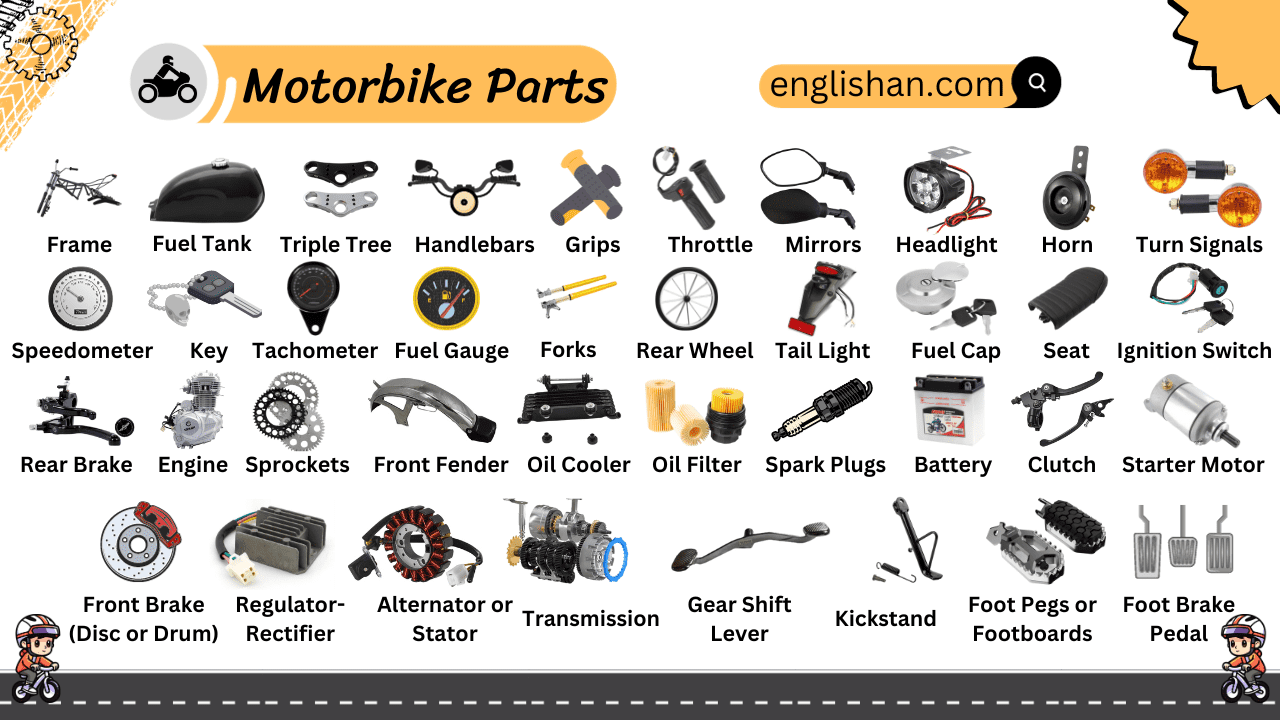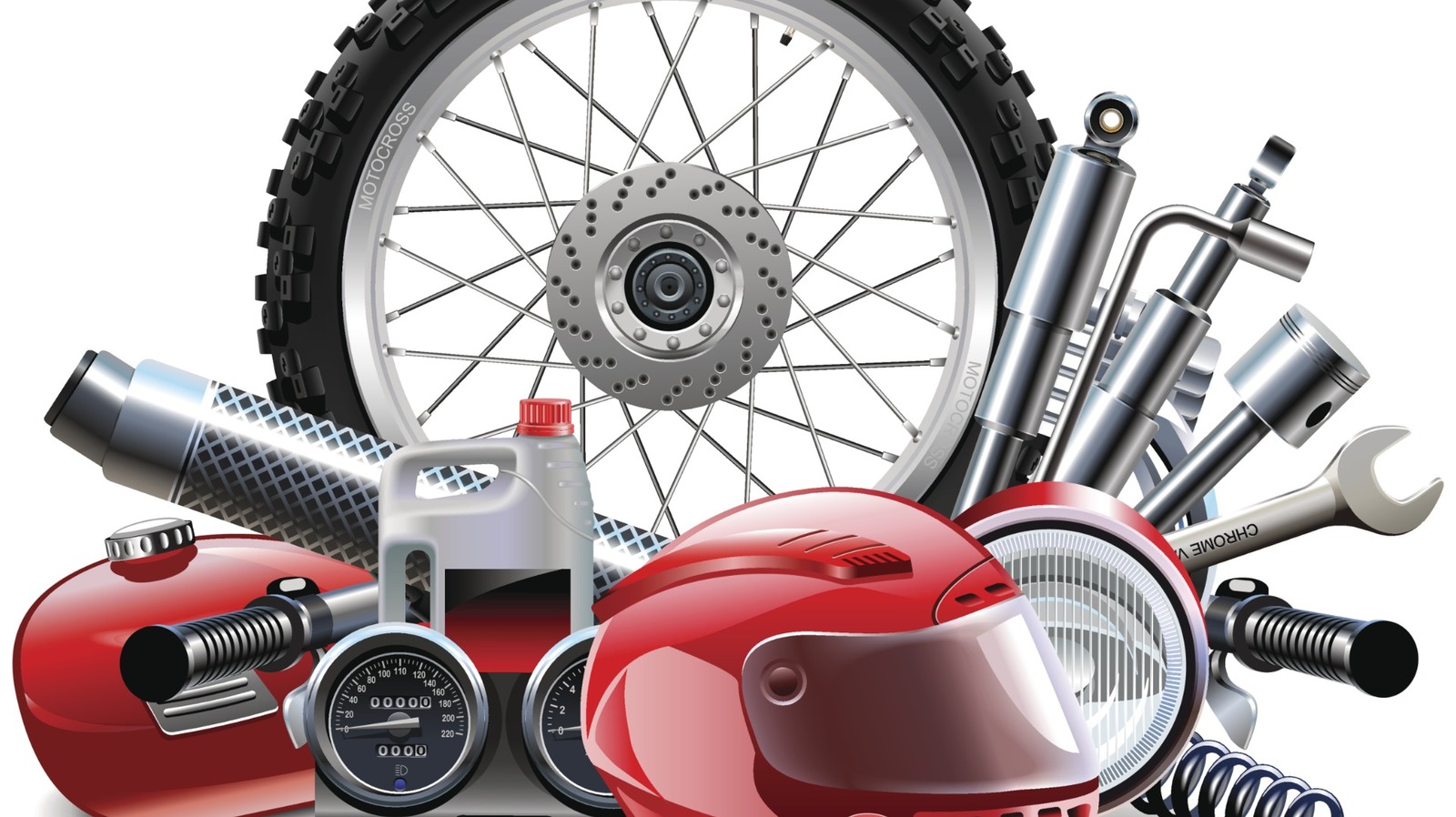Why Riders Prefer Original Motorcycle Parts Auckland Over Aftermarket Brands
Why Riders Prefer Original Motorcycle Parts Auckland Over Aftermarket Brands
Blog Article
Discover the Important Motorcycle Components You Required for Optimum Efficiency
Understanding the crucial parts of a bike is essential for attaining peak performance. Each part, from the engine to the braking system, plays an essential role in total performance and safety. Routine upkeep can protect against unanticipated failings and enhance the riding experience. Lots of bikers ignore the intricacies of these systems. Discovering how they interact can bring about a much more reliable ride. What important parts should every cyclist prioritize?
The Engine: The Heart of Your Motorbike
The engine serves as the core element of a motorbike, driving its performance and specifying its capacities. It is accountable for transforming fuel right into power, which powers the bike onward. Various kinds of engines are employed, consisting of single-cylinder, V-twin, and inline arrangements, each offering distinct qualities fit for different riding designs and objectives. The engine dimension, normally gauged in cubic centimeters (cc), considerably influences performance, with larger engines normally providing more power and torque.Furthermore, the engine's style and modern technology, such as gas injection systems or air-cooling versus liquid-cooling, influence effectiveness and integrity. Upkeep is necessary for peak operation; variables like regular oil modifications and monitoring ignition system guarantee durability. Motorcyclists typically think about an engine's responsiveness and smoothness, as these characteristics enhance the general riding experience. Eventually, the engine stays an essential element that specifies not only the motorbike's efficiency but also the cyclist's link to the equipment.
The Transmission: Shifting Gears Smoothly
The transmission plays an essential duty in a motorbike's efficiency, especially in the mechanics of equipment shifting. Understanding how to shift equipments efficiently can improve the total riding experience, while regular maintenance warranties peak capability. Proper attention to these facets can substantially impact the durability and effectiveness of the motorbike.

Equipment Shifting Mechanics
Smooth gear moving is vital for suitable motorcycle performance, significantly affecting both acceleration and control. The mechanics of equipment moving include the communication between the clutch, gear lever, and transmission system. When a cyclist involves the clutch, it disengages the engine from the transmission, enabling a gear adjustment without damaging the components. A well-timed release of the clutch, incorporated with accurate movement of the equipment lever, assists in a seamless change in between gears. This process ensures that the engine operates within its finest power band, enhancing efficiency. Motorbike Components NZ. In addition, recognizing the equipment ratios and their effect on speed and torque can aid riders make notified choices throughout changes, inevitably adding to an extra receptive and satisfying riding experience
Maintenance Tips Relevance
Routine upkeep plays an essential function in ensuring that the transmission system operates successfully, permitting smooth equipment changes. Routinely examining and changing the transmission fluid is crucial, as old liquid can bring about increased friction and wear. Furthermore, evaluating the clutch for wear warranties peak interaction and disengagement, avoiding slippage during equipment modifications. Lubrication of relocating components is just as essential to decrease rubbing and enhance performance. Motorbike owners should also monitor for leakages and uncommon sounds, as these can suggest underlying concerns. By sticking to these upkeep suggestions, motorcyclists can extend the lifespan of their transmission system, assuring that gear changes stay smooth and adding to the overall efficiency of their motorbike.
The Braking System: Ensuring Security on Every Experience
Braking systems are fundamental components that straight affect a motorbike's safety and performance. They are composed of numerous parts, including brake pads, blades, calipers, and hydraulic lines, all functioning together to guarantee effective slowdown. The type of stopping system-- typically either disc or drum-- affects responsiveness and stopping power.Regular upkeep is essential to copyright peak performance; used brake pads can result in reduced performance and enhanced quiting ranges. Additionally, the high quality of brake fluid should be kept an eye on, as it can soak up dampness in time, endangering stopping efficiency.Riders need to also take into consideration the significance of anti-lock braking systems (ABS), which protect against wheel lockup throughout abrupt quits, improving general security. Appropriately functioning brakes are not simply about stopping; they instill self-confidence in the motorcyclist, enabling much safer navigation through numerous terrains. Ultimately, a trustworthy stopping system is crucial for delighting in every adventure with comfort.
The Suspension: Enhancing Comfort and Control
A well-functioning shock absorber substantially adds to a motorbike's overall performance, complementing the effectiveness of the stopping system. The suspension plays a considerable role in absorbing shocks from unequal surfaces, assuring a smoother adventure while maintaining tire contact with the roadway. This get in touch with is vital for both stability and control, allowing cyclists to browse edges with confidence and precision.Different sorts of shock absorber, such as telescopic forks or mono-shocks, supply varying levels of comfort and handling. Correctly tuned suspension improves responsiveness, providing the biker with an extra linked feel to the motorcycle. Normal maintenance checks are vital to identify the suspension components, including dampers and springtimes, are operating at their best. A reliable shock absorber not only boosts the riding experience yet also adds to the durability of other motorcycle components by reducing damage. Because of this, purchasing top quality suspension is vital for any severe motorcycle enthusiast.
The Tires: Linking You to the Road
Tires play an essential function in a motorbike's efficiency, working as the main web link between the biker and the roadway. Comprehending the various types of tires readily available can significantly influence handling and security. Furthermore, regular maintenance is essential to ensure peak tire efficiency and long life.
Tire Keys In Explained
Just how do different tire kinds affect a motorbike's performance? Tire types play an important function in identifying a motorcycle's grasp, handling, and security. Sporting activity tires, developed for high efficiency, deal enhanced grip and responsiveness on paved roads, making them perfect for racing and aggressive riding. On the other hand, exploring tires prioritize sturdiness and comfort, giving a smoother trip for long-distance travel. Off-road tires, defined by their tough tread patterns, master traction on unpaved surface areas, appropriate for adventure fanatics. In addition, dual-sport tires blend features from both off-road and on-road classifications, accommodating flexible riding needs. Inevitably, picking the best tire kind is crucial for enhancing efficiency, ensuring safety and Continue security, and boosting the total riding experience.
Maintenance Tips Offered
While riding on the roadway, keeping excellent tire problem is vital for safety and efficiency. Routinely inspecting tire pressure is necessary, as under-inflated tires can cause bad handling and enhanced wear. It is recommended to evaluate tread deepness regularly; used tires compromise grip and stability. Additionally, motorcyclists ought to seek indicators of damages, such as bulges or fractures, which can show the need for substitute. Revolving tires occasionally assures also use, boosting durability. Keeping tires tidy from debris and preventing extreme visuals can lengthen their life expectancy. Maintaining appropriate alignment and balance adds to come to a head efficiency, decreasing stress on other bike elements. Sticking to these maintenance suggestions will substantially enhance the general riding experience.
The Fuel System: Sustaining Efficiency and Effectiveness
The fuel system plays an essential function in making best use of a motorcycle's efficiency and effectiveness, as it ensures the ideal shipment of gas to the engine. It comprises numerous important parts, including the gas storage tank, gas pump, fuel filter, and fuel injectors or carburetor. Each part should function efficiently to ensure a powerful and smooth ride.The fuel container stores fuel and supplies it to the engine through the fuel pump, which generates the necessary pressure. A fuel filter protects against pollutants from getting in the engine, while the injectors or carburetor mix gas with air for combustion.Proper upkeep of the gas system is essential; a clogged filter or malfunctioning injector can lead to decreased performance and increased fuel usage. By confirming that the gas system operates efficiently, bikers can appreciate enhanced throttle response, far better gas economy, and overall enhanced riding experience.
The Electric System: Powering Your Ride
An effective electric system is necessary for the general functionality and safety of a motorcycle, as it powers essential components such as the ignition, illumination, site here and different digital systems. This system consists of the battery, which shops power, and the alternator, accountable for producing power while the engine runs. The electrical wiring harness links these components, making certain reliable power distribution.Additionally, merges secure the system from overloads, while relays help control high-current devices with low-power signals. A well-maintained electric system boosts performance by making sure smooth starts and consistent operation of signals and lights, important for rider exposure and safety.Regular checks of the battery's cost and connections are very important for avoiding electric failures. Bikers must also examine circuitry for wear and tear, ensuring all parts function preferably. Inevitably, a robust electrical system contributes substantially to the general performance and integrity of the motorcycle.
Frequently Asked Inquiries
How Commonly Should I Replace My Bike's Battery?
The regularity of bike battery substitute depends on usage and maintenance (Motorcycle Parts Auckland). Normally, batteries need to be changed every 3 to five years. Regular checks can aid determine when a substitute is essential resource for peak performance
What Tools Do I Required for Standard Motorbike Upkeep?
For basic motorcycle maintenance, one needs vital tools such as a socket collection, wrenches, screwdrivers, pliers, tire stress scale, and a torque wrench. These devices assist in reliable maintenance and ensure the motorcycle runs effectively and securely.
Exactly How Can I Enhance My Bike's Aerodynamics?
To enhance bike aerodynamics, one ought to think about readjusting fairings, making use of windshield extensions, maximizing body placement, and lowering total weight. These alterations aid decrease drag, improving security and fuel efficiency during trips.
What Are the Signs of a Failing Electric System?
Indications of a stopping working electrical system consist of dimming lights, trouble starting, uneven tool readings, and blown integrates. Motorbike Components NZ. Unusual scents or rust around battery terminals may likewise suggest underlying concerns needing prompt focus for security and efficiency

How Do I Pick the Right Oil for My Motorbike?
When choosing oil for a motorcycle, one must take into consideration the maker's specs, viscosity rankings, and the kind of riding. In addition, artificial versus conventional oil can affect performance and engine security, influencing the decision considerably. The engine dimension, commonly determined in cubic centimeters (cc), substantially influences efficiency, with bigger engines generally supplying more power and torque.Furthermore, the engine's layout and technology, such as gas injection systems or air-cooling versus liquid-cooling, influence performance and integrity. A well-functioning suspension system greatly contributes to a motorcycle's total performance, enhancing the effectiveness of the braking system. The fuel system plays a crucial function in making the most of a motorbike's performance and effectiveness, as it assures the optimal shipment of fuel to the engine. A gas filter stops impurities from getting in the engine, while the injectors or carburetor mix gas with air for combustion.Proper upkeep of the fuel system is critical; a blocked filter or malfunctioning injector can lead to lowered efficiency and increased gas usage. A well-kept electrical system improves efficiency by making certain smooth starts and regular operation of signals and lights, essential for cyclist presence and safety.Regular checks of the battery's cost and links are essential for protecting against electrical failures.
Report this page